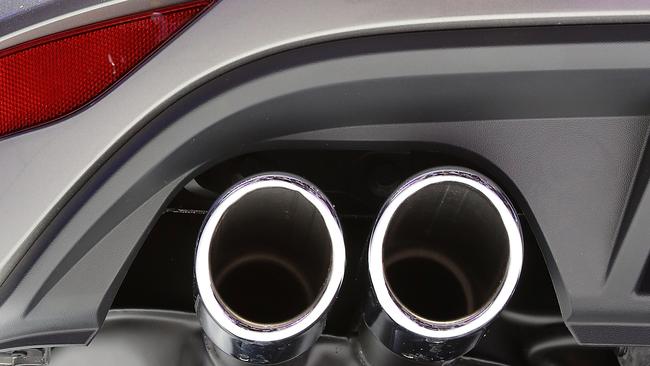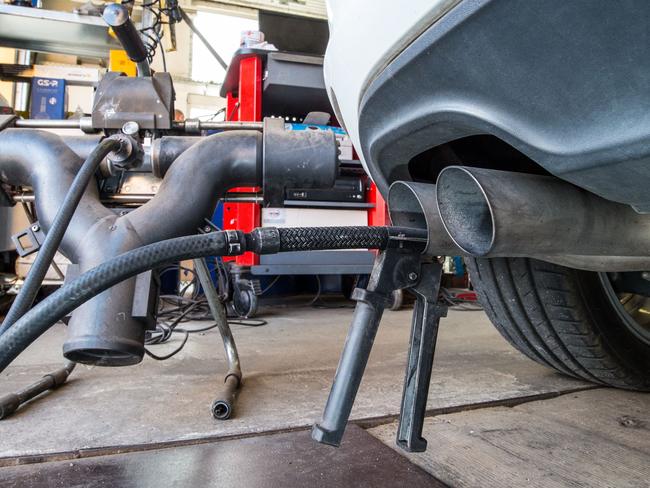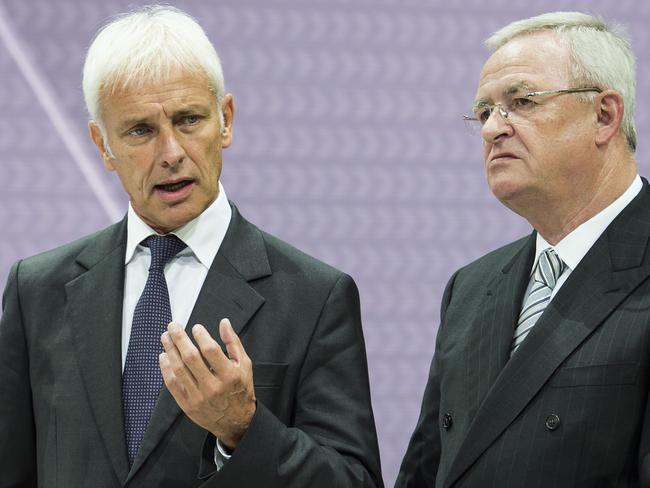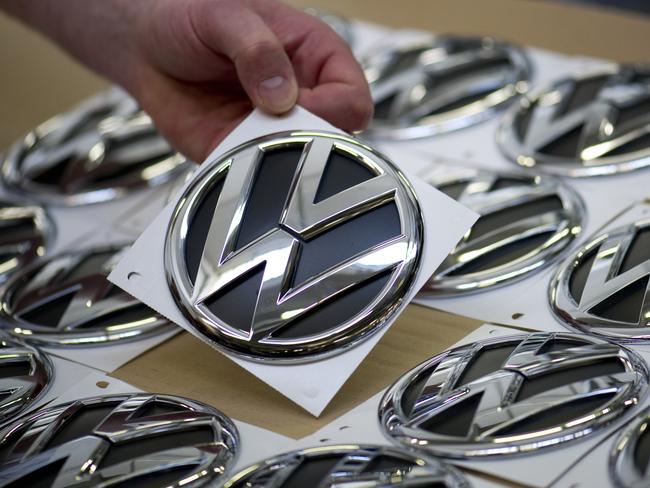Volkswagen scandal: How the car manufacturer used dirty tricks, got caught and the lesson learnt
WHETHER you drive a Volkswagen or not, we could all eventually end up with cheaper fuel bills and more efficient cars following this week’s diesel scandal.

WHETHER you drive a Volkswagen or not, we could all eventually end up with cheaper fuel bills and more efficient cars following this week’s diesel scandal.
A couple of curious “clean air” campaigners with the help of a West Virginia University — which discovered the “cheat mode” in May 2014 — have exposed how flawed the testing procedures are for fuel economy and emissions of new vehicles around the world.
In the US, Europe and Australia — and almost every country on the planet — governments rely on the honesty of car makers to test their own vehicles and then supply their own data to back their claims.
Rarely, if ever, are the claims checked. And even then they are checked in the same way the tests are done, which is why VW thought it would never get caught.
Instead, governments around the world threaten car makers with huge fines if they cheat the system.
But Volkswagen is the first car maker to ever be caught, and even then it was by accident.
In 1998 a truck company was busted for the same thing and fined $1 billion in the US. Experts assumed the rest of the industry would learn from this painful lesson.
MORE: How US science beat Volkswagen’s tech

Clearly at least one brand didn’t and now Volkswagen is paying the price. So far it has set aside $10 billion (6.5 billion Euros) to cover the cost of rectification work and compensation claims.
But that figure is expected to climb. There are fines expected from US government departments. Authorities in Europe have also made enquiries.
In Australia, Volkswagen will likely be hit with a feather, if at all.
Our emissions standards are so far behind the US and Europe it will be difficult to determine which cars, if any, have breached our low bar.
Europe is up to the emissions standard known as EU6, Australia is still at EU4. We don’t get EU5 until November 2016.
That said, it is unlikely our emissions standards are 35 times lower than Europe and the USA.
That’s the discrepancy the curious campaigners found when testing a selection of VW diesel cars on real roads in real driving conditions in early 2014.
When they tested the cars in a laboratory — in the same way all cars are tested — the VWs passed.
When they put the same testing equipment on the cars in real-world driving conditions, certain toxins blew their meters by 5 and 35 times the limit.

The emissions targets are hard to meet, especially for diesels. Regardless of the “clean diesel” message, the reality is they belch far more deadly toxins than unleaded engines.
Car makers the world over have been complaining about the emissions targets for years.
The campaigners were initially trying to demonstrate how good the VW diesels were and sought to back-up the company’s claim with an independent test.
And then they discovered the opposite was true.
Even more strict fuel economy standards are due by 2020. Between now and then the European Union is coming up with a more reliable fuel economy and emissions test to better reflect real world performance.
It means that hopefully motorists will get a little closer to achieving the fuel economy averages displayed on the window sticker when they buy the car.
VW has not yet explained how the cheat mode in the car’s engine management computer worked.
But a vehicle emissions tester at one of Australia’s three car manufacturers, speaking to News Corp Australia under condition of anonymity, said “it would be easy” to come up with a way to beat the system.
“The cars are tested on a rolling road dynometer, so the front wheels are spinning and the back wheels are not, and the steering wheel isn’t moving,” said the emissions tester.
“Then you have to accelerate to 50km/h within seven seconds to simulate the start of a city drive, and the test must be conducted between 20 and 30 degrees Celsius.
“If the car senses that, and it can with all the sensors it has on board these days, it would know it is doing an emissions test.”
Industry insiders say there may be another reason behind VW’s cheat mode.
Aside from more easily passing the emissions test, the bypass would likely have led to lower maintenance costs.
“When the system is working normally the EGR valve (exhaust gas recirculation) is sending the exhaust gases back through the intake manifold,” said the emissions expert.
“But it appears the EGR valve was either disconnected or greatly reduced in the real world, so you get less gunk — soot and oil and other horrible nasty stuff — in the engine because the toxins are going out the tail-pipe,” said the emissions expert. “It makes the car run better and you get less build-up.”
The insider added: “If you have a problem with durability and warranty claims, you would back the EGR right off. I believe that’s the only reason they would want to cheat. I don’t see any other reason they would want to cheat.”
Jack Haley, the vehicle engineering expert for the National Roads and Motorists Association says there are “a range of factors that come into the inaccuracy of fuel consumption labels”.
“The test the figures are based on are done in a laboratory, which is an artificial environment and doesn’t take into account different weather, road surfaces and driving techniques,” said Mr Haley.

“There are also things the manufacturers can do to optimise their figures without actually testing illegally, such as using the lowest rolling resistance tyres the car is approved for, putting up the tyres pressure to the maximum they recommend, disconnecting the alternator during the test. The requirements are quite loose and that’s why the EU is working on a new test procedure.”
Mr Haley says it is difficult to know if the VW cars breach Australian rules because, aside from the emissions testing facilities used internally by the three car makers Holden, Ford and Toyota, “we don’t do independent emissions testing in Australia”.
“The government just accepts the manufacturer’s figures, we don’t have a laboratory that could handle the volume (of vehicle emissions tests) that would be required,” said Mr Haley.
“We don’t even check the fuel consumption figures. That may be an issue for Fair Trading whether motorists are being mislead by the figures that are very difficult to replicate in normal driving.”
When asked if other brands could be roped into the scandal, given the apparent ease with which VW was able to beat the system, Mr Haley said: “They could be, but they would have to be very stupid.”
How VW was busted
May 2014
West Virginia University and a couple of clean air campaigners — Peter Mock and John German — complete a real-world driving test that found the toxic emissions in certain VW diesels were up to 35 times higher than what was allowed. The results are forwarded to the US Environmental Protection Agency, VW is formally asked to explain the discrepancy.
December 2014
After initially claiming there must have been a glitch with the diesel cars tested, Volkswagen recalled approximately 500,000 vehicles to address the emissions discrepancies.
May 2015
US authorities conduct follow-up tests on the recalled vehicles and discover they are still belching out too many toxins. None of VW’s explanations for the discrepancy satisfy authorities.
June 2015
VW is warned their latest diesel cars will not be approved for sale until the issue is resolved with the older cars. This is believed to be the first time the US government has been forced to use its powers to stop sales of vehicles that are already in showrooms.
3 September 2015
VW admits to authorities it used software to skirt US emissions regulations.
18 September 2015
The EPA in the US makes its findings public, VW announces 486,000 cars in the US are affected.
22 September 2015
VW says the number of diesel cars with the cheat mode has climbed to 11 million globally and includes other VW-owned brands such as Audi and Skoda.
23 September 2015
Representatives for VW, Skoda and Audi in Australia say they are awaiting advice from Germany regarding which, if any, cars sold locally are affected. Figures obtained by News Corp Australia show more than 50,000 diesel Golf hatchbacks, Tiguan SUVs and Passat sedans and wagons were sold from 2009 to 2015.



